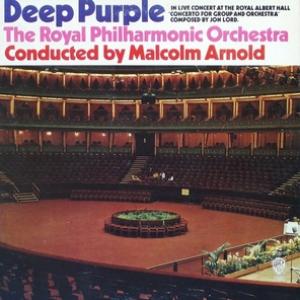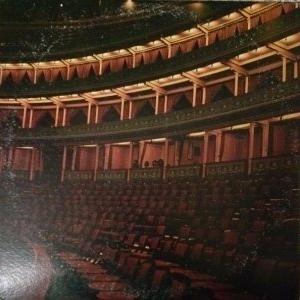Concerto For Group And Orchestra
by Deep Purple


Artist:
Deep Purple , Royal Philharmonic Orchestra
Label:
Warner Bros. Records
Catalog#:
WS 1860
Format:
Vinyl
Country:
United States
Released:
1970-01
| Tracklist | |||
| A1 | First Movement | 19:12 | |
| A2 | Second Movement | 6:20 | |
| B1 | Second Movement Part Two | 12:38 | |
| B2 | Third Movement | 15:46 | |
Credits
Bass Guitar - Roger Glover
Composed By - Jon Lord
Conductor - Malcolm Arnold
Drums - Ian Paice
Guitar - Ritchie Blackmore
Keyboards - Jon Lord
Vocals - Ian Gillan
Notes
Recorded at The Royal Albert Hall.
Strawberry Bricks Entry:
In 1968, Deep Purple scored great success in America with a cover of Joe South's "Hush," but their three albums for the Tetragrammaton label were patchy at best. Although the musicianship was high, with Jon Lord's classically-inspired organ breaks and Ritchie Blackmore's arpeggio runs and big riffs, they had a 60s-sounding vocalist in Rod Evans. Rocking-out Colosseum style, the instrumental "Hard Road (Wring That Neck)" from Book Of Taliesyn was arguably the best nugget from that period. When the label folded, the band regrouped and brought on Roger Glover and Ian Gillan from Episode Six. The first release from the Mark II lineup was Lord's five-part Concerto For Group And Orchestra. Recorded and broadcast from the Royal Albert Hall, the band warmed up with three songs ("Wring That Neck," "Child in Time" and "Hush") before launching into the "classical" piece. The Royal Philharmonic Orchestra play, the band rocks out, the Philharmonic play some more, the band rocks out… and so it goes. Lord's classical writing is of soundtrack-quality at best, while the band's parts are typical heavy rock with a lot—and I mean a lot—of soloing. Not a great integration; but it was, as Lord said, "a beginning." Sounds more like an excuse. Still, it was Deep Purple's first charting album in the UK, hitting No. 26. Six months later, the band released the single "Black Night" b/w "Speed King" from the album In Rock. Lord's classical ambitions were shelved (though the band's version of his Gemini Suite would follow), and Blackmore now guided their heavy riffing formula off the timeline and on to mammoth international success as one of the premier heavy rock bands of the 1970s. Just look to Italy for more successful attempts at fusing rock music with an orchestra.

